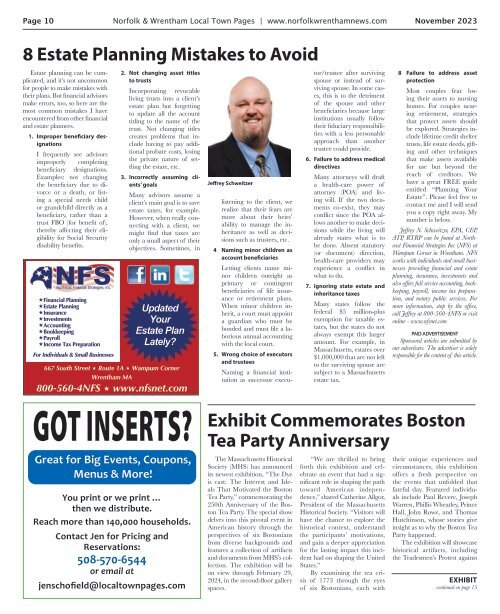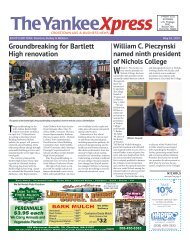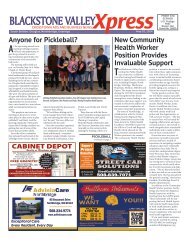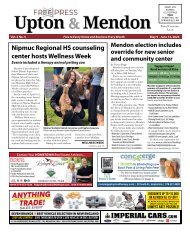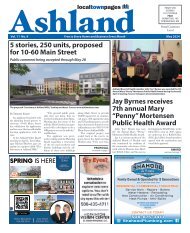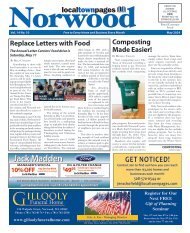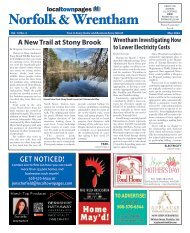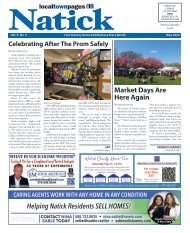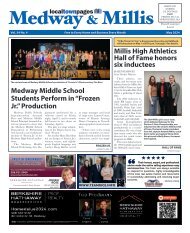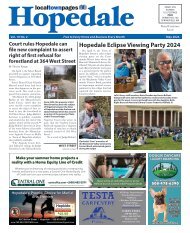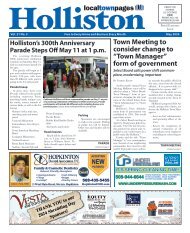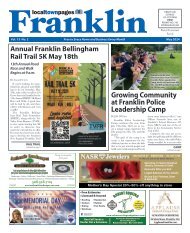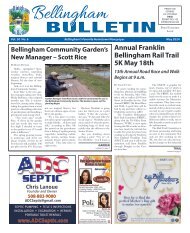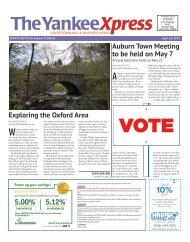Create successful ePaper yourself
Turn your PDF publications into a flip-book with our unique Google optimized e-Paper software.
Page 10 <strong>Norfolk</strong> & <strong>Wrentham</strong> Local Town Pages | www.norfolkwrenthamnews.com <strong>November</strong> <strong>2023</strong><br />
8 Estate Planning Mistakes to Avoid<br />
Estate planning can be complicated,<br />
and it’s not uncommon<br />
for people to make mistakes with<br />
their plans. But financial advisors<br />
make errors, too, so here are the<br />
most common mistakes I have<br />
encountered from other financial<br />
and estate planners.<br />
1. Improper beneficiary designations<br />
I frequently see advisors<br />
improperly completing<br />
beneficiary designations.<br />
Examples: not changing<br />
the beneficiary due to divorce<br />
or a death, or listing<br />
a special needs child<br />
or grandchild directly as a<br />
beneficiary, rather than a<br />
trust FBO (for benefit of),<br />
thereby affecting their eligibility<br />
for Social Security<br />
disability benefits.<br />
Financial Planning<br />
Estate Planning<br />
Insurance<br />
Investments<br />
Accounting<br />
Bookkeeping<br />
Payroll<br />
Income Tax Preparation<br />
For Individuals & Small Businesses<br />
2. Not changing asset titles<br />
to trusts<br />
Incorporating revocable<br />
living trusts into a client’s<br />
estate plan but forgetting<br />
to update all the account<br />
titling to the name of the<br />
trust. Not changing titles<br />
creates problems that include<br />
having to pay additional<br />
probate costs, losing<br />
the private nature of settling<br />
the estate, etc.<br />
3. Incorrectly assuming clients’<br />
goals<br />
Many advisors assume a<br />
client’s main goal is to save<br />
estate taxes, for example.<br />
However, when really connecting<br />
with a client, we<br />
might find that taxes are<br />
only a small aspect of their<br />
objectives. Sometimes, in<br />
Updated<br />
Your<br />
Estate Plan<br />
Lately?<br />
667 South Street Route 1A Wampum Corner<br />
<strong>Wrentham</strong> MA<br />
800-560-4NFS www.nfsnet.com<br />
Jeffrey Schweitzer<br />
listening to the client, we<br />
realize that their fears are<br />
more about their heirs’<br />
ability to manage the inheritance<br />
as well as decisions<br />
such as trustees, etc.<br />
4 Naming minor children as<br />
account beneficiaries<br />
Letting clients name minor<br />
children outright as<br />
primary or contingent<br />
beneficiaries of life insurance<br />
or retirement plans.<br />
When minor children inherit,<br />
a court must appoint<br />
a guardian who must be<br />
bonded and must file a laborious<br />
annual accounting<br />
with the local court.<br />
5. Wrong choice of executors<br />
and trustees<br />
Naming a financial institution<br />
as successor executor/trustee<br />
after surviving<br />
spouse or instead of surviving<br />
spouse. In some cases,<br />
this is to the detriment<br />
of the spouse and other<br />
beneficiaries because large<br />
institutions usually follow<br />
their fiduciary responsibilities<br />
with a less personable<br />
approach than another<br />
trustee could provide.<br />
6. Failure to address medical<br />
directives<br />
Many attorneys will draft<br />
a health-care power of<br />
attorney (POA) and living<br />
will. If the two documents<br />
co-exist, they may<br />
conflict since the POA allows<br />
another to make decisions<br />
while the living will<br />
already states what is to<br />
be done. Absent statutory<br />
(or document) direction,<br />
health-care providers may<br />
experience a conflict in<br />
what to do.<br />
7. Ignoring state estate and<br />
inheritance taxes<br />
Many states follow the<br />
federal $5 million-plus<br />
exemption for taxable estates,<br />
but the states do not<br />
always exempt this larger<br />
amount. For example, in<br />
Massachusetts, estates over<br />
$1,000,000 that are not left<br />
to the surviving spouse are<br />
subject to a Massachusetts<br />
estate tax.<br />
8 Failure to address asset<br />
protection<br />
Most couples fear losing<br />
their assets to nursing<br />
homes. For couples nearing<br />
retirement, strategies<br />
that protect assets should<br />
be explored. Strategies include<br />
lifetime credit shelter<br />
trusts, life estate deeds, gifting<br />
and other techniques<br />
that make assets available<br />
for use but beyond the<br />
reach of creditors. We<br />
have a great FREE guide<br />
entitled “Planning Your<br />
Estate”. Please feel free to<br />
contact me and I will send<br />
you a copy right away. My<br />
number is below.<br />
Jeffrey N. Schweitzer, EPA, CEP,<br />
ATP, RTRP can be found at Northeast<br />
Financial Strategies Inc (NFS) at<br />
Wampum Corner in <strong>Wrentham</strong>. NFS<br />
works with individuals and small businesses<br />
providing financial and estate<br />
planning, insurance, investments and<br />
also offers full service accounting, bookkeeping,<br />
payroll, income tax preparation,<br />
and notary public services. For<br />
more information, stop by the office,<br />
call Jeffrey at 800-560-4NFS or visit<br />
online - www.nfsnet.com<br />
PAID ADVERTISEMENT<br />
Sponsored articles are submitted by<br />
our advertisers. The advertiser is solely<br />
responsible for the content of this article.<br />
GOT INSERTS?<br />
Great for Big Events, Coupons,<br />
Menus & More!<br />
You print or we print …<br />
then we distribute.<br />
Reach more than 140,000 households.<br />
Contact Jen for Pricing and<br />
Reservations:<br />
508-570-6544<br />
or email at<br />
jenschofield@localtownpages.com<br />
Exhibit Commemorates Boston<br />
Tea Party Anniversary<br />
The Massachusetts Historical<br />
Society (MHS) has announced<br />
its newest exhibition, “The Dye<br />
is cast: The Interest and Ideals<br />
That Motivated the Boston<br />
Tea Party,” commemorating the<br />
250th Anniversary of the Boston<br />
Tea Party. The special show<br />
delves into this pivotal event in<br />
American history through the<br />
perspectives of six Bostonians<br />
from diverse backgrounds and<br />
features a collection of artifacts<br />
and documents from MHS’s collection.<br />
The exhibition will be<br />
on view through February 29,<br />
2024, in the second-floor gallery<br />
spaces.<br />
“We are thrilled to bring<br />
forth this exhibition and celebrate<br />
an event that had a significant<br />
role in shaping the path<br />
toward American independence,”<br />
shared Catherine Allgor,<br />
President of the Massachusetts<br />
Historical Society. “Visitors will<br />
have the chance to explore the<br />
historical context, understand<br />
the participants’ motivations,<br />
and gain a deeper appreciation<br />
for the lasting impact this incident<br />
had on shaping the United<br />
States.”<br />
By examining the tea crisis<br />
of 1773 through the eyes<br />
of six Bostonians, each with<br />
their unique experiences and<br />
circumstances, this exhibition<br />
offers a fresh perspective on<br />
the events that unfolded that<br />
fateful day. Featured individuals<br />
include Paul Revere, Joseph<br />
Warren, Phillis Wheatley, Prince<br />
Hall, John Rowe, and Thomas<br />
Hutchinson, whose stories give<br />
insight as to why the Boston Tea<br />
Party happened.<br />
The exhibition will showcase<br />
historical artifacts, including<br />
the Tradesmen’s Protest against<br />
EXHIBIT<br />
continued on page 15


